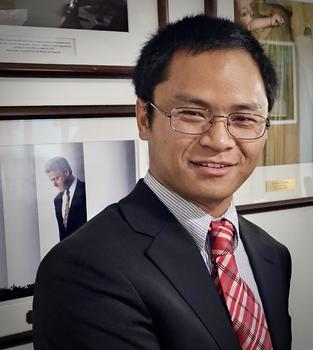
North Korea currently presents both direct and indirect security concerns for the U.S. and, indeed the world. Its nuclear arsenal and missile capabilities pose a direct threat to specific regions, while its potential to influence other nations is strong.
Former South Korea navy captain Joshua Park is a visiting research fellow at the Schar School of Policy and Government at George Mason University. He is also an adjunct professor, teaching a course called North Korea Security (GOVT 444) that calls on his extensive military experience in conveying a robust foundational understanding of the Democratic People’s Republic of Korea and a thorough examination of its intricate network of foreign relations. Ultimately, Park delves into the intriguing dynamics between North Korea and the broader strategic competition among nations.
On a Thursday in September, Park introduced to the class a guest speaker who provided exclusive insight to contemporary life in North Korea and its foreign relations. The speaker, Justin Seo, is a defector from North Korea, having escaped from North Korea to China with his family in 2005.
Seo vividly narrated a detailed PowerPoint presentation that illustrated the concepts they have been studying as only someone who lived there could.
Seo stated how the propaganda implemented by the North Korean government runs rampant in the news, and civilians have essentially no choice but to believe it. Additionally, most civilians are required to spend a minimum of 10 years in the military, unless their status is deemed unworthy of serving the family of supreme leader Kim Jong Un. In that case, they are likely subject to a life of abject poverty.
North Korea’s flawed education system, he said, was rife with systemic concerns unimaginable to Western thinking.
“In People’s school,” he said, “the students are told to bring valuable things to school. Students may be asked to bring aluminum, herbs, human or animal wastes, rice, firewood, and sometimes money. The teachers collect these items under the dictator’s name to condition students to be subject to the rule of the Kim family at a young age.”
Seo added that students are taught to worship the Kim Jong Un family beginning as early as kindergarten.
Not surprisingly, Seo received a large number of questions from the Schar School class, including one that made his North Korea experience personal: “If you hypothetically had the power to tell all of North Korea one message, what would you tell them?”
“I would tell them to remain aware of their situation and to stay determined,” he said. “There is no one message that could solve the problems of North Korea, but if the people can stay strong, perhaps positive change lies ahead.”
Seo also encouraged the class to share news of the systemic realities of North Korea, such as their human rights violations and a recent summit cementing relations with Russia, as much as possible. He emphasized pressuring the U.S. Congress to accept North Korean people as international refugees.
The students in Park’s class said they were thrilled to have an engaging guest as Seo.
“Being able to hear Mr. Seo describe his background was an extremely fulfilling event,” said Government and International Politics major Jake Moran. “At this moment, I felt very grateful that I decided to take North Korean Security with Professor Park. Seeing a North Korean defector speak his mind with his presentation truly made the class standout relative to the other government classes I have taken.”
“Justin Seo’s guest lecture painted a vivid picture of the hardships that North Koreans face in their everyday lives,” said government major Jim Corcoran. “After hearing his story and learning about his perspective, I feel that I can better appreciate the human costs that the regime’s systems of oppression impose on their own people.
“I feel that this class, or any class on North Korea, would be incomplete without being able to learn firsthand about what life is like for ordinary citizens.”
